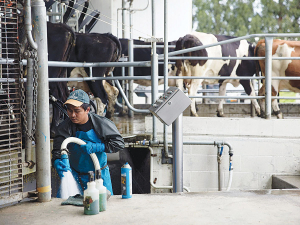Genetics, Efficiency and Performance: How the Burgesses are raising the bar at Te Poi
Bill and Michelle Burgess had an eye-opening realisation when they produced the same with fewer cows.
 DairyNZ says the Government’s decision to allow 300 more international dairy farm workers into New Zealand doesn’t do enough to help resolve the sector’s significant staff shortage.
DairyNZ says the Government’s decision to allow 300 more international dairy farm workers into New Zealand doesn’t do enough to help resolve the sector’s significant staff shortage.
DairyNZ says the Government’s decision to allow 300 more international dairy farm workers into New Zealand doesn’t do enough to help resolve the sector’s significant staff shortage.
In November, the dairy sector requested the Government allow 1500 dairy workers into New Zealand in 2022, but only 300 spots have been granted, in a decision communicated to industry last week.
DairyNZ chief executive Dr Tim Mackle says the Government’s decision will be a bitter disappointment for many under-pressure dairy farmers who are anxiously facing yet another season critically short-staffed.
“This is a wellbeing issue, in terms of mental wellbeing but also health and safety on farm. Understaffing increases the risk of accidents and can put animal welfare at risk. Dairy farmers are working long hours to keep their farms going, but it just isn’t sustainable,” says Mackle.
He says DairyNZ will continue to advocate for more international workers.
“We have really appreciated the continued support of Minister O’Connor and also MPI who have advocated on this important issue for almost two years – but it would seem some of their colleagues in Government just aren’t listening and farmers are frustrated by that.
“Although 300 workers will help a small number of farmers, it’s a drop in the bucket for New Zealand’s largest export sector which is at least 4000 workers short.
"This issue won't just affect the dairy sector - we all access the same domestic talent pool, whether that's between primary sectors or from support industries like rural contracting and trucking companies. The decision will have a knock-on effect on many other sectors."
Mackle says farmers who want farm assistants on board for calving are encouraged to apply now for one of the 300 spaces, as there is no guarantee another opportunity to recruit international workers before calving will be possible.
“With workers no longer required to isolate or stay in MIQ and no cap on the number of farm assistants within that 300, we expect stronger interest from farmers using the class exception pathway.”
He says many farmers will struggle to get through the busy calving season without enough people on-farm.
Recent data indicates the dairy sector is now short of up to 4000 workers. Staff shortages have been exacerbated by the border closure and some international workers leaving New Zealand.
Mackle says the current record low unemployment rate is affecting all sectors’ ability to recruit Kiwis, including dairy.
A Taranaki farmer and livestock agent who illegally swapped NAIT tags from cows infected with a bovine disease in an attempt to sell the cows has been fined $15,000.
Bill and Michelle Burgess had an eye-opening realisation when they produced the same with fewer cows.
It was love that first led Leah Prankerd to dairying. Decades later, it's her passion for the industry keeping her there, supporting, and inspiring farmers across the region.
Rangitikei Rivers Catchment Collective (RRCC) chairperson Roger Dalrymple says farmers in his region are taking a national lead in water quality awareness and monitoring.
One young couple is proving farm ownership is still within reach for young Kiwis.
Greenlea Premier Meats managing director Anthony (Tony) Egan says receiving the officer of the New Zealand Order of Merit (ONZM) honour has been humbling.